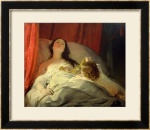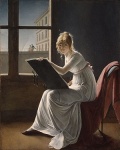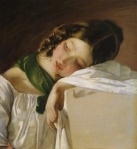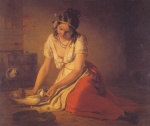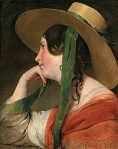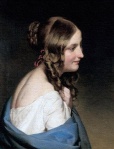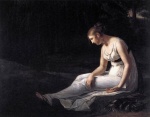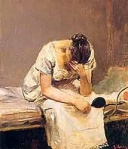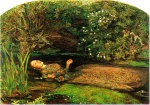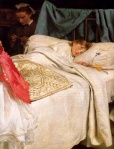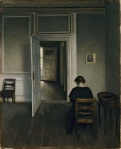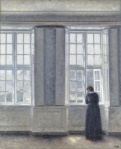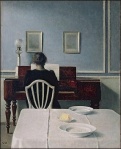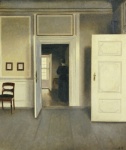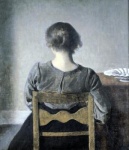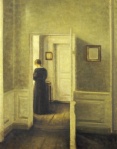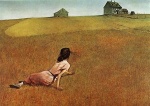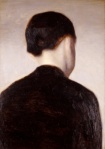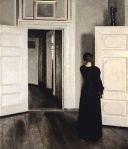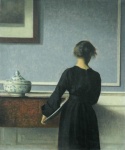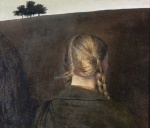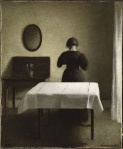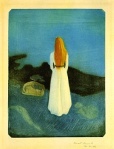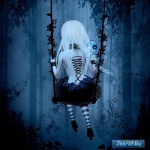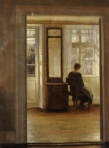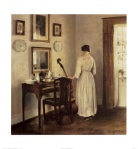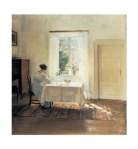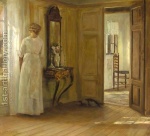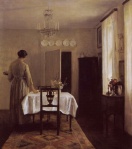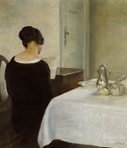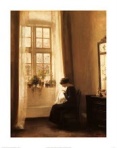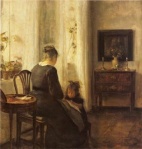CONTINUED FROM HERE: https://weirdmonger.blogspot.com/2023/08/torque-tales-by-df-lewis-part-one.html
***
NAAN BREAD AND SLIPPERS
My shopping lists tend to be eclectic as well as quite lengthy. However, the day I visited Colchester to see my elderly Mother, my list was much shorter than normal, but equally eclectic. We needed to pass through the St Botolph’s Priory Ruins as a short cut to where she lived a sheltered life.
But the rest of that trip must remain a private one – now completed, with the peshwari naan bread consumed and the new carpet slippers fitting feet and well worn about the house.
So, we’ll leave that shopping list of two items to become another fiction of history, just a non-event eventually to become a false memory of something real. This is as much of life (now, then or forever) that one can manage.
Time itself, if not eclectic, is very lengthy. But one simply allows it to slip by without the consciousness of recalled choice: too easily oiled by non-stick serendipity or fast-fading existence.
Sadly, my story is therefore about a man whose need for naan bread and slippers was as fictitious as the need to be himself. A nothing dreamed by a nothingness.
His beloved mother became a dead silent ghost by his side, even if, at best, her walking-stick could still be heard clicking along Colchester’s pavements. The comforting familiarity of her shrill voice echoing from the past … or pre-echoing a time when she, as another ghost, shadowed an earlier self that was even less real than she would become. Shadowy Thirds all of them at different stages.
The man’s responses were slightly out of rhythm with the real man he surely must once have been – out of rhythm but synchronised enough to foster a feasible belief in himself.
The slippers were too soft to make sound in the comfort zones of Heaven. But I was now less than nothing – not even a fictitious ghost. Only crumbs of communion bread and a tattered shopping-list slipping away in the otherwise empty wind. And Naan became a new mystical word for Nothingness.
***
THE CUPOLA
They ended up not wanting to have names. A group of people who ripped off their unseen labels one by one. There needed to be an example set, however. Nobody would unname themselves without a lead to follow. A First Mover. The pre-emptive Clockmaker. If this were a proper story, the author would start with the example-setting character’s name – followed by a narrative of his rite-of-passage from name to namelessness. A tale of bravery and hardship, of a dimmer-switch controlling the light of the character’s identity, of those who failed to follow and remained named, of those who did follow and became unnamed.
Yet to name the leading character as he was once named would be to jam the dimmer-switch by wedging in what the character itself was trying to dim. The others who remained named would gain prominence by having real characters’ names in the story while the rest floundered about unidentified – not only confusing the pecking-orders within the plot but the plot itself. To call them by false names or even by letters like A, B, C would, no doubt, cloud the issue even further. Meanwhile, it’s good for any story’s author to relax and concentrate on the plot’s landscape, its spirit of place, before worrying about the entrance of characters,
The public park in Colchester, with Norman Castle, flower-neatened gardens, an empty bandstand the tiny original of which decorates, as a cupola, the top of the nearby Wivenhoe church tower. In the park, meantime, the castle and its gardens eventually led down grassy slopes, somehow circularly zigzagging, towards a small boating-lake in the park’s valley. Nobody has hired a boat today. It must be one of those times when everyone is asleep at home. The Longest Day of the year. Light at Night like the Land of the Midnight Sun. Or the irrecurrent Blue Moon. Even here in England’s Essex. With the dimmer-switch of the Sun turned right up.
Without people, there can be no story to tell. But now, at first dimly seen, are tall dark shadows wandering around the Castle. They are the nameless Masters of Existence trying to form gradually into real people. They have been given no belief in the story-premise that all the real people are at home sleeping. Yet the Masters, so-called, remain only partly formed into what they had hoped to become since the story had given them no names other than as fictionalised Masters of Existence, no names on which to hang their identities. The story refused them any such luxury. So mere shadows (if slightly flesh-corrupted) they have remained, still circling the Castle like forgotten druids. Masters of Existence who could not even master existence for themselves!
Suddenly, there appeared, on the margins of the boating-lake, the legendary Clockmaker whose clocks had hands but no numbers but, sometimes, numbers but no hands, because, with the former, one could at least guess the time they told. A real flesh-and-blood person, this Clockmaker. As taught by Masters, but lacking their ambition of existence, the Clockmaker actually succeeded in becoming what they had desired but failed to be. The Clockmaker knew that any ambition destroys the goal of that same ambition.
And now is time for waking. We are here, stretching and yawning, fully-formed, still nameless, as stirred by many pre-alarmed timepieces within our minds, but we are pure of heart and unconstrained by the deadlines of finding identities to wrap ourselves in. Owning identities simply by yearning for identities to own, because the only pre-condition for having an identity is not to have one at all.
And the story can at last begin. From the boating lake, there slowly rose the tip of a huge turning cathedral dome with its own cupola as the timepiece’s essential gnomon.
“How shall a man find his way unless he lose it?” — Walter de la Mare
***
PIRATE
You heard earlier, in these Miniatures, of caryatids with vertical eye-patches, and pirate radio stations off the coast of old Essex, yet they seemed disconnected from what happened later, such as the small talk that has since become more grandiose than the pub, as an ex-mansion conversion, in which such small talk was spoken….
.
“A pirate as a person or a group involves an element of illegality or at least a bending of the rules, does it not?”
It sounded more like a statement than a question. And a long way short of a chat-up line, I guess. He stared at me at the dark bar on the edge of a nowhere where, lost, cold and hungry, I had just left my car in its car park of no obvious allotted spaces.
Women on their own in such places must be a rare event, I continued to guess. I had only come in here for directions, while deciding whether or not to partake of the establishment’s ‘hospitality’.
I looked sideways at the solitary barstool-occupant. He acted as if he had just seen a ghost. An old bookish man judging by what he held close to his chest.
“Excuse me?”
“A pirate can also mean people who are not eligible for things but take them nevertheless.”
I felt affronted. Could he mean me? Perhaps this was a club for carefully chosen members and I had parked my car outside ‘illegally’?
I was immediately inclined to leave without further conversation. This was part of the country to which I was unaccustomed. Visiting someone from University days I hadn’t seen for years. We’d just got reacquainted by some internet finding-old-friends site. Maybe old friends were not meant to rediscover each other – as in the old days, with very little means to do so. Such precarious reunions could cause all manner of ‘not-meant-to-be’ situations – and the world, via such a Butterfly Effect, sent off into directions equally ‘not-meant-to-be’. These were not original thoughts of mine that I was thinking as I waited to decide about my next move in the dark bar. I had had these thoughts for some time when deciding to pursue, via the internet, certain lost friendships in the first place. But there was something ringing at the back of my mind about my current predicament in the dark bar being a ‘not-meant-to-be’ direction of some significant risk to my health and safety. A pirate destiny, as it were.
If words could be caught like infections – there I had just thought about the word that seemed to be preoccupying the man in glasses who had just used it – twice. As if he was toying with it. Worrying it, teasing it, trying it out on his lips. Obsessed with it. Clutching the book closer to his chest.
A member of the bar staff – and I was pleased to see it was a female of some age and heft – now suddenly arrived in my vicinity hopefully to take my order.
“Is that your car outside?”
She pointed at a shape I could hardly discern through the window.
“I guess it is,” I said.
“Well, can you move it? It’s private.”
So, I hadn’t been far wrong with my earlier presumptions. But the place had a sign outside indicating it was a public bar serving drink and food.
“Private?” I responded in questioning echo.
“Yes, private.”
“Private,” more forcefully echoed the man in dark glasses.
“Is this private, too?” I asked with a nod towards the bar, trying to take some initiative without antagonising anyone with a forceful reference to the public sign outside.
Thoughts raced through my head. Time seemed to stand still. Many things put on the internet with the wrong assumption of it being private were often available for viewing by many millions. Just see the hit counter if there is one to see at all. Just because these potential millions don’t make their presence known to you does not mean they aren’t there, watching, reading, toying with you, hunting your ghost as a symbol of the real ‘you’, and, with their teasles, worrying at your words … obsessing … storing up a whole host of ‘not-meant-to-be’ scenarios. How often have you conducted what you think is a private conversation on a blog or a supposedly ill-frequented forum – only to discover it was far from private. It’s easy to imagine seclusion even when millions are watching you.
Suddenly, the bar woman pointed at a word engraved on the mirror – the backs of the shorts and optics reflected dimly in it.
The word was, of course, “Private”. Except the letters seemed slightly mixed up and one letter had teasingly been rubbed off as if in a game. It was then I saw in the relative darkness that the woman was wearing a black patch over one eye, fixed in place by a single elastic band across the top of her scarfed head. Stepping nearer, the man took off his glasses, then opened his chest and spoke…
.
There was a book on my bookcase – among an eclectic collection of other books – entitled ‘Pirate’ that I could not recall seeing there before. It seemed strange as it was at the level of the bookcase to where my eyes often wandered while naturally day-dreaming during work at my nearby desk.
The book had gold tooling on a navy-blue spine of some evident age. It showed no author’s name just ‘Pirate’ at the top in upper case and the publisher’s name (‘Torque & Jongleur’) at the bottom in lower case other than the ‘T’ and ‘J’.
Any such day-dreams suddenly dispersed, no doubt in some sub-conscious need to fasten upon what truly troubled me: the appearance of a mysterious book on my bookcase, sitting between familiar books in a neatly displayed row with continued intolerance towards further insertions. Not too tight for jiggle-room, yet tight enough to prevent leaning. So which book was missing – to have left room for the infiltrator?
I somehow fell short of pulling ‘Pirate’ from its position to investigate its nature: a more pressing matter, one would have thought, than ascertaining what it had replaced! Indeed, I couldn’t actually fathom what book it had replaced. They all seemed duly present and shipshape. The two tall books, now each side of ‘Pirate’, used to stand squarely and stylishly together, I was sure, i.e. ‘The Women I Met in Bars’ directly next to ‘The Ghostfarers’, both by the same living author of whom I cannot speak without giving this author a name.
I stretched out my hand to draw ‘Pirate’ from its berth. My finger pulled gently at the top of the spine. There was plenty of give. It was a smooth delight to deliver it to existence beyond the bookcase. I felt its heft in my hand, a chunkiness that many special books of a certain age retained when one would have thought they could have lost substance over the years by shedding or flaking from the stitched areas. Or moulting or sloughing as a part of foxing from the undust-wrappered boards or articulated outer rind.
I imagined – upon opening it – that I would hear a crack when the book’s long unread ‘closetness’ was broken after seasons of gestation. I shook my head. The day-dreams had been taking me over again with a vengeance, it seemed.
The crack had indeed awoken me as I now gazed at the title page, slightly obscured by the tenuous quiff of the book’s conjoined ribbon-marker.
What seemed to be a large insect was squashed, too, as a rorschach patch at the crease of the pages. A sign from days when contraband shipped such exotic or fantastical creatures from foreign gardens and jungles to other climes where these creatures ill-survived … but not before attacking those who opened books that were never meant to be read given the otherwise sane import and export laws designed to prevent things that were never meant to be where they ended up.
Meanwhile the flanking books audibly leaned in the silence … keeping even dead memories alive with the prevailing dreams they once triggered.
***
DROWSY WITH DIVINITY
There was an exhibition of paintings of women with their backs to us. I, as a woman, wondered why anyone would think to paint these paintings or arrange such a display of mixed motives: scornful watchfuless, loving care at a distance, stalking, pining…
In fact, these name-hidden presences hung on gallery walls have given me some of the clues as to the possible permutations of reaction to such a ‘happening’ of themed images.
As I walked around the gallery, I tried to put myself in the mind of each man who stood or sat behind each woman in the paintings … thus concocting for myself a new recipe of tempting emotions fitting for such an apparently bleak, often oblique experience.
Have you ever sensed eyes boring into your back? You dare not turn for whatever reason. It’s almost as if you are guilty about catching someone looking at you surreptitiously. They’re to blame for their own actions (or inaction in not looking away) but you feel guilty that you may have stirred their curiosity, their longing, distaste or even gratuitousness of idle gaze.
Well, today, that day, whenever it was to be, in that gallery-of-few-visitors but many guards-sitting-in-corners, you now somehow gazed at the backviews of each painting itself, knowing, in some intrinsic dream bordering on nightmare, that you were staring outward from the frame you could no longer see …. and you cried inwardly as you felt itches crawling along your back and nape of neck between canvas and frame’s backing. Or between canvas and paint. You could not be sure. Just the distant echo of a shout from a corner-guard whose words were deadened by the glass.
***
Later, I was filled by some greater sense of existence, ironically a drowsiness with divinity in various roles of painterly art. To the distant sound of violins, drums and flutes, reminding us that the planet’s paintings are subject to the twists of precarious immortality just as our own mortality is assured.
***
Symbols of genuine drowsiness or Null Immortalis? And backs turned towards us.
***
HANDLES
I was reminded of the handle that one needed to turn on a fruit machine or old-fashioned calculator, a contraption as a whole modelled in the shape of …what was it? I can’t now remember, with different stories between then and now, between up there and down here. I then made the tea for myself and my guest.
As I stood in the kitchen waiting for it to brew, I found my thoughts wandering. All things in the world have their handles. Some handles are handles proper, made to be handles. Other things have makeshift or ad hoc handles, and were obvious as handles once you began to handle an object, like a pen or a book or anything without an obvious protuberance to use as a handle. The kettle had a handle: the least hot place as well as one to fit the hand conveniently. A teapot and teacup, too. But the packet of biscuits I was about to open had no obvious handle to grab, but grab it I did at one end. What about the water I had used to fill the kettle? How would I grab that, should I need to do so? I laughed at the prospect of grabbing the handle of water. The tap had a handle of sorts – one that moved and did a job, i.e. to make the water pour, but the water itself was not handleable, and even if it were, it would seep through the fingers however tightly you kept them together. Like meanings themselves or a mad scientist’s inventions or implanted codes in texts like Easter eggs.
What about my thoughts themselves? There was an expression about ‘getting a handle’ on things…
Armed with a tray – teapot, two cups and saucers, milk jug, sugar bowl, biscuits on plates, all balanced precariously upon it – I returned to the sitting-room.
I asked, without further delay: “Why were you stuffing snotty tissues down my sofa?”
Silence. Nobody on the sofa. Well, nobody on it. I saw something pink and suggestive stuffed down the side where my guest had been sitting. Except I was the guest, and the host hadn’t yet showed up. I wriggled up and waited.
.
There was a belief that the wheel would last forever. The strongest design possible was, after all, the classic circular wheel that meant all forces around it played against each other before being able to focus any end force against the thing itself. Therefore, I stared at the nameless person as host who finally showed up and then revealed for me his design for a wheel and I could not believe it was a wheel at all. It seemed square but with handles or levers along most of its exterior points, levers that changed position as the whole thing was pushed … each lever levering the others with a series of internal pulleys and springs. I thought a real wheel would have been so much simpler – and I laughed.
And he laughed, too, as he produced from behind his back – like a conjuror – another thing he called a wheel…
“I am going to have another…” he intoned.
I expected him to continue the sentence. Another what? Another cup of tea? I signalled the question with a single glance. But he remained silent, merely showing me another object and then another. As if they weren’t objects at all but speculative ‘anothers’, each ‘another’ complete in itself without another word following it to act as noun or descriptor.
Each ‘another’ was an invention. An invention of another invention. From would-be wheels, he progressed to was-once-upon-a-time musical instruments, and from those to never-could-have-been items of clothing. He even managed to produce a has-been. A ghost of an existence that took shape before my very eyes as he tugged pulleys, stretched out springs and opened hinges, above all turned a thousand tiny handles, the ghost’s eyelids echoing my own with each tweak he gave the contraptions. Was this finally the real ghost I had always sought?
To come full circle, I watched the nameless person’s would-be bones refuse to fuse … and he clunked to a halt on a hillock like a premonition of a modern stairway of stone steps.
I climbed them expecting each one to be the last. But there was always another.
.
But before I could reach the final attic, I found a master bedroom where there was a collection of handles on the wall. To put any collections at all on walls was something I never understood at the best of times, like animal heads as trophies or various varieties of fork obtained for show rather than use. Forks with long or short tines. Forks more like garden implements than cutlery. And forks tuned for use between different purposes.
Paintings, of course, were fully intended to go on walls, to be viewed separately as well as cumulatively within the room’s. context. Most paintings were framed to give some comfort zone between them and the room. Every room has its own context, you see. Some call that context atmosphere or decorative personality. A room with its own original or inherent quality as a living-space. Or a room whose very sense of existence as a room was force-fed by human intervention with such collections or other imposed alterations. Even where the vast reaches above me gave way towards attic-complexes.
Well, all forks had handles. Except, of course, one variety of fork. A variety that had tines but no handle and called a Dunsany fork after its inventor. Often used in the old days as a childhood mouth-clamp to prevent irregular growth of the jaws. But more often used today – when fine-tuned – to sit as a specialist bridge on a violin.
So, on further reflection, it would be understandable to have the history of forks upon a wall, just for show, educative as well as visually aesthetic. More of a sculpture as art-installation than a painting, of course. Muck rakes, turnip snoflers, faggot forks (with just two wide-set prongs), dung probers, dock extractors and a species of fork that had two prongs but not so wide-set as the faggot fork, prongs as if set about the distance between my eyes instead.
But to have on your wall just the forks’ handles or, now I’m thinking about it, the handles of many different implements, all without their business ends? That was slightly more eccentric than seemed acceptable, don’t you think?
The nameless person but one defined by gender, who had evidently followed me here, looked as if he thought I were the mad one in broaching the subject at all. And he possibly feared that he was mad, too, in listening for as long as he had listened to me going on about collections on walls.
He was a Lord as born from the House, I now decided . I’d call it a Mansion, more like. A Lord of some standing. I had been invited, I now remembered, for an audition as his potential biographer. I had taken my nerves in hand – as, like many writers, I was untutored in social skills – and arrived, brief-case in hand, full of proof statements as to my experience being a writer-up of lives, some dead, a few still living. The latter unnamed.
The subject of wall-collections had arisen because I had commented upon the collection he had on his own wall. I treated the subject as a sort of ice-breaker.
“Handy things, failsafe handles like that ,” I said, nodding towards them. “How many have you got?”
“Three thousand around and about,” he said, in an irritated voice. I could read in his eyes that I was not going to get the job. I should go for broke.
“Are they all safes?” No answer. “Their handles with coded combinations?” No answer. “How do you remember all the codes?” No answer. “Are some of them pretend safes with nothing behind?”
I must have crossed some politeness threshold. I was shown the door.
I don’t suppose anyone ever wrote my biography. My memory now shrinking even as fast as I did myself. If not a biography, at least you have this very memento that is more than what most people get written up about themselves. A memento of how I spent the rest of my days in the darkness picking at a lock from inside with my teeth. Or were they implants shaped like tiny forks?
***
CONTINUED HERE:
https://weirdmonger.blogspot.com/2023/09/torque-tales-3-by-df-lewis.html